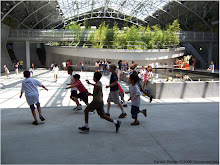 [By Justine Roberts]
[By Justine Roberts]Building on Maeryta's post from last week- I'd like to say that not only are 21st century skills important for both children and adults, but we believe museums are uniquely positioned to support their development.
21st Century skills are those skills that are needed by the workforce in a post-industrial, knowledge-based economy. Museums are clearly wonderful places to spark imagination, encourage questions, risk taking, persistence, and trial and error. Some museums are better at making their visitors comfortable, leading to the kind of un-selfconsciousness and frustration tolerance needed for lifelong learning. But skills development - as opposed to content transfer for example - is in museums' sweet spot.
About two weeks ago, IMLS published a new report titled 21st Century Skills, which attempts to “outline a vision for the role of libraries and museums in the national dialogue around learning” in the new century. It identifies a set of skill categories, and the key skills within each, that museums and libraries are best positioned to support. The report also includes analysis of societal changes that affect the expectations and needs of our audiences, and a discussion of why focusing on skills development matters now. Along with case studies from all types of museums and libraries from around the country is a chart that summarizes the 20th century museum model and contrasts it with that needed for a 21st century museum.
In addition to being useful as a program planning tool, the 36-page report is intended to serve as an institutional planning tool. To this end, it includes a self-assessment that allows museums and libraries to evaluate their organizational culture. The implication is that any organization that hopes its visitors will develop problem solving and lateral thinking skills for example, needs to model those behaviors within its own staff and structures.






No comments:
Post a Comment